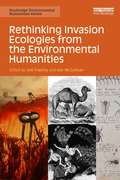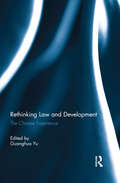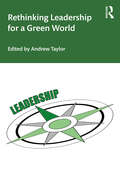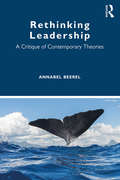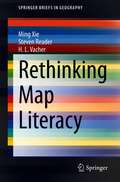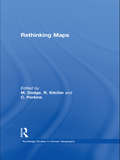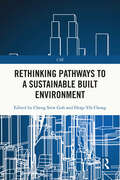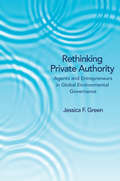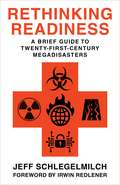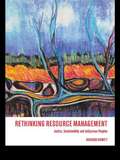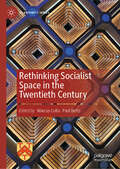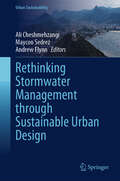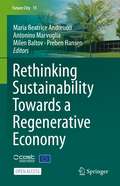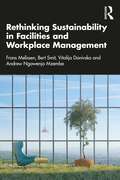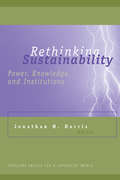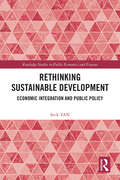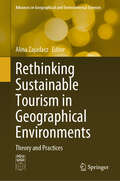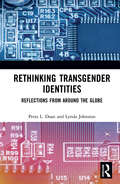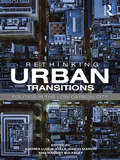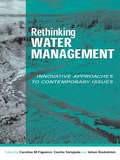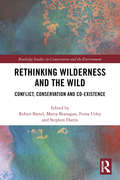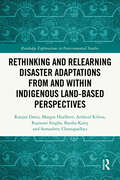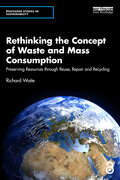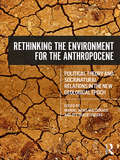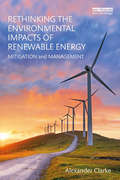- Table View
- List View
Rethinking Invasion Ecologies from the Environmental Humanities: Rethinking Invasion Ecologies From The Environmental Humanities (Routledge Environmental Humanities)
by Iain McCalman Jodi FrawleyResearch from a humanist perspective has much to offer in interrogating the social and cultural ramifications of invasion ecologies. The impossibility of securing national boundaries against accidental transfer and the unpredictable climatic changes of our time have introduced new dimensions and hazards to this old issue. Written by a team of international scholars, this book allows us to rethink the impact on national, regional or local ecologies of the deliberate or accidental introduction of foreign species, plant and animal. Modern environmental approaches that treat nature with naïve realism or mobilize it as a moral absolute, unaware or unwilling to accept that it is informed by specific cultural and temporal values, are doomed to fail. Instead, this book shows that we need to understand the complex interactions of ecologies and societies in the past, present and future over the Anthropocene, in order to address problems of the global environmental crisis. It demonstrates how humanistic methods and disciplines can be used to bring fresh clarity and perspective on this long vexed aspect of environmental thought and practice. <P><P>Students and researchers in environmental studies, invasion ecology, conservation biology, environmental ethics, environmental history and environmental policy will welcome this major contribution to environmental humanities.
Rethinking Law and Development: The Chinese experience
by Guanghua YuThis book is the result of the collective effort of some of the foremost experts and scholars of Chinese law, Asian law, and Chinese economics and carefully examines the relationship between law and China’s economic development. Serious inquiries and candid opinions of the contributors have made for stimulating discussion and debate in many controversial areas. This book is likely to result in further research into factors affecting China’s economic development, political change, and China’s interaction with the international community. The book explores the development of the Chinese legal system from both China’s historical perspective, taking into account the specific political and socioeconomic factors that are shaping Chinese law, and from a comparative perspective exploring the interaction between China and the rest of the world. The book brings together key international scholars of Chinese law and economics including Hualing Fu, Roda Mushkat, Randall Peerenboom, Zhigang Tao and Frank Upham. The first part of the book focuses on the linkages between the formal law and China’s economic development, looking at Chinese courts, economic institutions and firm behaviour as well as contract enforcement and property rights. Part two deals with issues of law, human rights, and social justice as they relate to economic and human development. Taken as a whole, the book offers a unique discourse on the interaction between law and economic and human development in China.
Rethinking Leadership for a Green World
by Andrew TaylorFirst James Lovelock, and recently Prince William and David Attenborough believe that we have reached a tipping point in the process of climate change. Whether they are right or not, it is certainly true that the impact of humankind upon the ecology of the earth has reached a point where real changes in human behaviour are required. If managers are to be enablers of planetary survival then we need to develop a new approach to risk, which explicitly includes ecological limits upon economic behaviour. This implies a fundamental reorientation of their role in allocating resources to minimise risk and maximise reward. This book brings together some of the brightest contemporary thinkers on leadership, complexity and sustainability to consider the big ideas that we will need to make the changes required, and to outline the major themes that can inform a new approach to constructing a green world. It looks at how to ensure that local models of sustainability are able to flourish in the context of global networks and presents specific case studies of markets and organisations that offer insights into the development integrated solutions and the leadership lessons we can learn. Combining both theory and practice, this book serves to guide business managers and provides deeper insight and critical perspectives on some of the key issues facing leaders moving towards the green economy. It also provides useful supplementary reading for students in business and environmental studies.
Rethinking Leadership: A Critique of Contemporary Theories
by Annabel BeerelThis book provides a detailed review of the key leadership theories and skills required during times of crises and radical uncertainty, how these can be developed, and how they can be applied in practice. Written over the course of the 2020 pandemic, the book highlights the immense lack of leadership competencies required for effective leadership in times of radical uncertainty and provides in-depth insights into the capacities and skills that should be part of all leadership development. The latest leadership theories, as well as existing key styles, including mindful leadership, the neuroscience of leadership, and transpersonal and adaptive leadership, are discussed and critiqued along with their potential contribution to developing effective leaders. Each chapter concludes with a convenient executive summary and questions that can be used for teaching purposes and class discussion. This is a comprehensive book about the interdisciplinary and multifaceted requirements of leadership and how to attain those capacities to develop effective leaders. It will be valuable for advanced undergraduate as well as postgraduate courses as a foundational resource on leadership theory and its application in practice.
Rethinking Map Literacy (SpringerBriefs in Geography)
by Ming Xie Steven Reader H. L. VacherThis book provides two conceptual frameworks for further investigation of map literacy and fills in a gap in map literacy studies, addressing the distinction between reference maps and thematic maps and the varying uses of quantitative map literacy (QML) within and between the two. The text offers two conceptual frameworks and uses specific map examples to explore this variability in map reading skills and knowledge, with the goal of informing educational pedagogy and practices within geography and related disciplines. The book will appeal to cartographers and geographers as a new perspective on a tool of communication they have long employed in their disciplines, and will also appeal to those involved in the educational pedagogy of information and data literacy as a way to conceptualize the development of curricula and teaching materials in the increasingly important arena of the interplay between quantitative data and map-based graphics. The first framework discussed is based on a three-set Venn model, and addresses the content and relationships of three “literacies” – map literacy, quantitative literacy and background information. As part of this framework, the field of QML is introduced, conceptualized, and defined as the knowledge (concepts, skills and facts) required to accurately read, use, interpret and understand the quantitative information embedded in geographic backgrounds. The second framework is of a compositional triangle based on (1) the ratio of reference to thematic map purpose and (2) the level of generalization and/or distortion within maps. In combination, these two parameters allow for any type of map to be located within the triangle as a prelude to considering the type and level of quantitative literacy that comes into play during map reading. Based on the two frameworks mentioned above, the pedagogical tool of “word problems” is applied to “map literacy” in an innovative way to explore the variability of map reading skills and knowledge based on specific map examples.
Rethinking Maps: New Frontiers in Cartographic Theory (Routledge Studies in Human Geography)
by Rob Kitchin Martin Dodge Chris PerkinsMaps are changing. They have become important and fashionable once more. Rethinking Maps brings together leading researchers to explore how maps are being rethought, made and used, and what these changes mean for working cartographers, applied mapping research, and cartographic scholarship. It offers a contemporary assessment of the diverse forms that mapping now takes and, drawing upon a number of theoretic perspectives and disciplines, provides an insightful commentary on new ontological and epistemological thinking with respect to cartography. This book presents a diverse set of approaches to a wide range of map forms and activities in what is presently a rapidly changing field. It employs a multi-disciplinary approach to important contemporary mapping practices, with chapters written by leading theorists who have an international reputation for innovative thinking. Much of the new research around mapping is emerging as critical dialogue between practice and theory and this book has chapters focused on intersections with play, race and cinema. Other chapters discuss cartographic representation, sustainable mapping and visual geographies. It also considers how alternative models of map creation and use such as open-source mappings and map mash-up are being creatively explored by programmers, artists and activists. There is also an examination of the work of various ‘everyday mappers’ in diverse social and cultural contexts. This blend of conceptual chapters and theoretically directed case studies provides an excellent resource suited to a broad spectrum of researchers, advanced undergraduate and postgraduate students in human geography, GIScience and cartography, visual anthropology, media studies, graphic design and computer graphics. Rethinking Maps is a necessary and significant text for all those studying or having an interest in cartography.
Rethinking Pathways to a Sustainable Built Environment (CIB)
by Cheng Siew Goh Heap-Yih ChongThis book aims to provide insights into rethinking pathways in the transition to sustainable built environments in the wake of the pandemic and COP26. It examines our abilities and capabilities to leverage resources to the best use for achieving the universal sustainable development goals. The goal is to identify fresh thinking to make the goals of sustainable built environment more achievable, particularly to align with the national and international targets set by COP26. The book will help address the need for mainstreaming sustainability into the core of decision making of buildings and infrastructure projects throughout the life cycle from planning, to design, construction and operation. This book consolidates a comprehensive body of knowledge of sustainable development that will equip industry professionals, educators, scholars, and students with knowledge and skills to deliver sustainability practice within the built environment. Through theoretical underpinning and presentation of best practices, the book offers solutions to advance the development of sustainability practices in the context of the built environment. The book covers the following content: Sharing of best practice and case studies Review of Sustainability Contemporary Practices in the Built Environment Innovative Net Zero/ Carbon neutral solutions and strategies Sustainable building assessment and certification systems Key Sustainability Deliverables in the Built Environment Social Transition towards Sustainability The book will be of value to interested scholars and practitioners who are involved in sustainable design and engineering practice within the built environment.
Rethinking Private Authority: Agents and Entrepreneurs in Global Environmental Governance
by Jessica F. GreenRethinking Private Authority examines the role of non-state actors in global environmental politics, arguing that a fuller understanding of their role requires a new way of conceptualizing private authority. Jessica Green identifies two distinct forms of private authority--one in which states delegate authority to private actors, and another in which entrepreneurial actors generate their own rules, persuading others to adopt them. Drawing on a wealth of empirical evidence spanning a century of environmental rule making, Green shows how the delegation of authority to private actors has played a small but consistent role in multilateral environmental agreements over the past fifty years, largely in the area of treaty implementation. This contrasts with entrepreneurial authority, where most private environmental rules have been created in the past two decades. Green traces how this dynamic and fast-growing form of private authority is becoming increasingly common in areas ranging from organic food to green building practices to sustainable tourism. She persuasively argues that the configuration of state preferences and the existing institutional landscape are paramount to explaining why private authority emerges and assumes the form that it does. In-depth cases on climate change provide evidence for her arguments. Groundbreaking in scope, Rethinking Private Authority demonstrates that authority in world politics is diffused across multiple levels and diverse actors, and it offers a more complete picture of how private actors are helping to shape our response to today's most pressing environmental problems.
Rethinking Readiness: A Brief Guide to Twenty-First-Century Megadisasters
by Professor Jeffrey SchlegelmilchAs human society continues to develop, we have increased the risk of large-scale disasters. From health care to infrastructure to national security, systems designed to keep us safe have also heightened the potential for catastrophe. The constant pressure of climate change, geopolitical conflict, and our tendency to ignore what is hard to grasp exacerbates potential dangers. How can we prepare for and prevent the twenty-first-century disasters on the horizon?Rethinking Readiness offers an expert introduction to human-made threats and vulnerabilities, with a focus on opportunities to reimagine how we approach disaster preparedness. Jeff Schlegelmilch identifies and explores the most critical threats facing the world today, detailing the dangers of pandemics, climate change, infrastructure collapse, cyberattacks, and nuclear conflict. Drawing on the latest research from leading experts, he provides an accessible overview of the causes and potential effects of these looming megadisasters. The book highlights the potential for building resilient, adaptable, and sustainable systems so that we can be better prepared to respond to and recover from future crises. Thoroughly grounded in scientific and policy expertise, Rethinking Readiness is an essential guide to this century’s biggest challenges in disaster management.
Rethinking Resource Management: Justice, Sustainability and Indigenous Peoples
by Richard HowittThis book offers students and practitioners a sophisticated and convincing framework for rethinking the usual approaches to resource management. It uses case studies to argue that professional resource managers do not take responsibility for the social and environmental consequences of their decisions on the often vulnerable indigenous communities they affect. It also discusses the invisibility of indigenous people' values and knowledge within traditional resource management. It offers a new approach to social impact assessment methods which are more participatory and empowering. The book employs a range of case studies from Australia, North America and Norway.
Rethinking Socialist Space in the Twentieth Century (St Antony's Series)
by Paul Betts Marcus CollaThis edited collection explores the problem of space under socialist regimes in the twentieth century. Bringing together contributions from international scholars with expertise in the architectural, urban, social, and cultural history of twentieth-century socialism, the book includes examples from China, Africa, Mongolia, Eastern Europe and the USSR. The volume reflects on how developments in the field over the past two decades have altered our understanding of how such spaces were constructed (both literally and discursively), how they could become sites of contested meanings, and how they were perceived outside the socialist world. Moreover, the volume is concerned with how scholarly approaches associated with post-colonialism, global history, gender history, and the ‘temporal’ and ‘sensory’ turns have reconfigured our knowledge of, and approach to, the history of socialist space.
Rethinking Stormwater Management through Sustainable Urban Design (Urban Sustainability)
by Ali Cheshmehzangi Andrew Flynn Maycon SedrezThis book provides a different narrative and approach to rethinking stormwater management through sustainable urban design. It delves into design interventions and innovative strategies that lead to solving context-specific issues of flooding, water scarcity, etc. Starting with an overarching introduction and discussion on stormwater management research, the book then primarily focuses on sustainable urban design practices, strategies, and policy guidelines. By summarising a selection of successful global case study examples, the book highlights how we should rethink stormwater management practices and policies from the design perspective. Through sustainable urban design suggestions, the book covers a wide range of conceptual examples to design and policy guidelines, as well as best practices that could be utilised for other contexts. The book is divided into two sections of: (1) architectural and urban design practices and interventions; and (2) policies and action plans. This collection helps researchers and scholars rethink stormwater management and consider innovative - and, more importantly, sustainable - design strategies that could help develop new paradigms and policies for water-related issues in cities and communities. This will interest multiple stakeholders, mainly urban policymakers, planners, urban designers, urban specialists, landscape architects, architects, and urban ecologists. It could be treated as a case study-based guide for governmental units dealing with water related issues in cities and urban areas.
Rethinking Sustainability Towards a Regenerative Economy (Future City #15)
by Preben Hansen Maria Beatrice Andreucci Antonino Marvuglia Milen BaltovThis open access book is based on work from the COST Action “RESTORE - REthinking Sustainability TOwards a Regenerative Economy'', and highlights how sustainability in buildings, facilities and urban governance is crucial for a future that is socially just, ecologically restorative, and economically viable, for Europe and the whole planet. In light of the search for fair solutions to the climate crisis, the authors outline the urgency for the built environment sector to implement adaptation and mitigation strategies, as well as a just transition. As shown in the chapters, this can be done by applying a broader framework that enriches places, people, ecology, culture, and climate, at the core of the design task - with a particular emphasis on the benefits towards health and resilient business practices.This book is one step on the way to a paradigm shift towards restorative sustainability for new and existing buildings. The authors want to promote forward thinking and multidisciplinary knowledge, leading to solutions that celebrate the richness of design creativity. In this vision, cities of the future will enhance users’ experience, health and wellbeing inside and outside of buildings, while reconciling anthropic ecosystems and nature. A valuable resource for scientists and students in environmental sciences and architecture, as well as policy makers, practitioners and investors in urban and regional development.
Rethinking Sustainability in Facilities and Workplace Management
by Bert Smit Frans Melissen Vitalija Danivska Andrew Ngawenja MzembeThis book discusses sustainability within the facility management industry. However, it is not another anthology of so-called best practices and the seemingly endless range of certification schemes. It is also not a (marketing) guide on how to communicate high-pitched sustainability ambitions to potential customers to increase (short-term) market share. Instead, this book is based on the realisation that most facility management businesses and departments actually find it hard to truly integrate sustainability into their strategies, tactics and day-to-day operations in a coherent way. It is also based on the reference point that sustainable development cannot be realised only through technological advancements and new procedures; it requires new behavioural patterns of people. Not only of your own employees, as a supplier or department, but also of those for whom you design, stage and manage optimal workplace experiences. Those patterns will not emerge from nowhere but need to be purposely created and cultivated, based on a thorough understanding of what people and organisations need, want and desire. Through reviewing specific barriers and opportunities related to practical situations and examples at all three levels of facility management – the operational, tactical and strategic level – and supported by the latest theoretical insights, this book provides students and practitioners with inspiration and suggestions for using sustainability as a guideline for improving workplace experience concepts and FM strategies, services and processes. Each chapter uses specific cases and examples as the starting point for reflecting on avenues to move from treating sustainability as an add-on to using it as a powerful concept to create optimal workplace experiences. In doing so, these reflections provide lecturers, students and current and future professionals with practical guidelines and pointers to take sustainability within the facility management industry to a much-needed next level.
Rethinking Sustainability: Power, Knowledge, and Institutions
by Jonathan M. HarrisBringing together the thoughts of economists, political scientists, anthropologists, philosophers, and agricultural policy professionals, this volume focuses on the issues of sustainability in development. Examining such topics as international trade, political power, gender roles, legal institutions, and agricultural research, the contributors focus on the missing links in theory and practice that have been barriers to the achievement of truly sustainable development. Any theory of sustainable development must take into account economic, social, and environmental dimensions. Until recently, the question "What is development?" was often answered predominantly from the economist's perspective, with high priority being assigned to expansion of economic output. Social, political, institutional, and ethical aspects have often been neglected. But now that sustainable development has become a broadly accepted concept, it is impossible to maintain a narrowly economistic view of development. For this reason, the varied perspectives offered by the contributors to this volume are crucial to understanding the process of development as it relates to environmental sustainability and human well-being. The selection of articles is meant to be stimulating and provocative rather than comp-rehensive. They are roughly divided between those dealing with broad theoretical issues concerning the economic, political, and social aspects of development (Part I) and those presenting more applied analysis (Part II). The common thread is a concern for examining which factors contribute to making development socially just and environmentally sound. Rethinking Sustainability will be of interest to economists and social scientists, development professionals, and instructors seeking to offer their students a broad perspective on development issues.
Rethinking Sustainable Development: Economic Integration and Public Policy (Routledge Studies in Public Economics and Finance)
by Seck TANThis book demonstrates falsified economic performance of global economies when the environment is not recognised as a capital, and when the ecosystem is overlooked towards sustainable development.Seck begins with an analysis of standard macroeconomic framework and policy practice. He argues, with reference to environmental accounting literature, that environmental capital must form an integral component of economic measurement. This paves the way for an alternative environmental-macroeconomics framework for policy analysis that promotes sustainable development. The book demonstrates how environmental capital can be measured with reference to select OECD countries and provides a methodology for analysing how macroeconomic goals are related to a steady-state economy. Seck then concludes with a summary of the conflict between current economic growth and ecosystem preservation, and outlines possible policy improvements and directions for research.Rethinking Sustainable Development is an invaluable reference for policymakers as well as researchers and students of environmental economics, sustainable development, and macroeconomics.
Rethinking Sustainable Tourism in Geographical Environments: Theory and Practices (Advances in Geographical and Environmental Sciences)
by Alina ZajadaczThis book covers the current escalation of social problems related to the unstable political situation, economic crisis, as well as growing problems related to the state of the natural environment (existential climate crisis; pollution of land, oceans, and the atmosphere; severe declines in biodiversity) which requires a new rethinking of the sustainable tourism paradigm, in relation to the realities of the modern world, based on the practices observed in the tourist services sector. „Tourism is like fire, you can cook food on it, you can also burn down your house”—says the proverb. On the one hand, it allows for the regeneration of physical and mental strength of visitors, as well as provides funds for the economic development of the destination, but on the other hand, it contributes to a lot of damage to the geographical environment. The period of "stopping" of tourism during the lockdown caused by the COVID-19 pandemic allowed many areas to be relieved of the tourist traffic, which resulted in the observed revitalization of the natural environment, but also huge social and economic problems in destinations that are largely dependent on income from tourism. The rapid resurgence of tourism after the pandemic restored revenues but also caused many social tensions. The problem of overtourism returned, and residents protested, calling for "tourists to go home." The entire tourism system requires a thorough analysis of the complex consequences of its development. This book presents many challenges facing contemporary tourism. Its theoretical and practical aspects provide a useful knowledge base for both researchers studying changes in tourism and practitioners in the tourism services sector. The content also serves as an inspiration to search for optimal solutions aimed at the sustainable development of contemporary and future tourism.
Rethinking Transgender Identities: Reflections from Around the Globe
by Petra L. Doan Lynda JohnstonThis volume explores the diversity and complexity of transgender people’s experiences and demonstrates that gendered bodies are constructed through different social, cultural and economic networks and through different spaces and places. Rethinking Transgender Identities brings together original research in the form of interviews, participatory methods, surveys, cultural texts and insightful commentary. The contributing scholars and activists are located in Aotearoa New Zealand, Brazil, Canada, Catalan, China, Japan, Scotland, Spain, and the United States. The collection explores the relationship between transgender identities and politics, lived realities, strategies, mobilizations, age, ethnicity, activisms and communities across different spatial scales and times. Taken together, the chapters extend current research and provide an uthoritative state-of-the-art review of current research, which will appeal to cholars and graduate students working within the fields of sociology, gender studies, sexuality and queer studies, family studies, media and cultural studies, psychology, health, law, criminology, politics and human geography.
Rethinking Urban Transitions: Politics in the Low Carbon City
by Harriet Bulkeley Simon Marvin Andrés Luque-AyalaRethinking Urban Transitions provides critical insight for societal and policy debates about the potential and limits of low carbon urbanism. It draws on over a decade of international research, undertaken by scholars across multiple disciplines concerned with analysing and shaping urban sustainability transitions. It seeks to open up the possibility of a new generation of urban low carbon transition research, which foregrounds the importance of political, geographical and developmental context in shaping the possibilities for a low carbon urban future. The book’s contributions propose an interpretation of urban low carbon transitions as primarily social, political and developmental processes. Rather than being primarily technical efforts aimed at measuring and mitigating greenhouse gases, the low carbon transition requires a shift in the mode and politics of urban development. The book argues that moving towards this model requires rethinking what it means to design, practise and mobilize low carbon in the city, while also acknowledging the presence of multiple and contested developmental pathways. Key to this shift is thinking about transitions, not solely as technical, infrastructural or systemic shifts, but also as a way of thinking about collective futures, societal development and governing modes – a recognition of the political and contested nature of low carbon urbanism. The various contributions provide novel conceptual frameworks as well as empirically rich cases through which we can begin to interrogate the relevance of socio-economic, political and developmental dimensions in the making or unmaking of low carbon in the city. The book draws on a diverse range of examples (including ‘world cities’ and ‘ordinary cities’) from North America, South America, Europe, Australia, Africa, India and China, to provide evidence that expectations, aspirations and plans to undertake purposive socio-technical transitions are both emerging and encountering resistance in different urban contexts. Rethinking Urban Transitions is an essential text for courses concerned with cities, climate change and environmental issues in sociology, politics, urban studies, planning, environmental studies, geography and the built environment.
Rethinking Water Management: Innovative Approaches to Contemporary Issues
by Johan Rockström Cecilia Tortajada Caroline M FiguèresIf water resources are to be distributed efficiently, equitably and cost-effectively in this rapidly changing world, then it is clear that current water management practices are no longer feasible. Innovative approaches are required to meet the increasing water demands of a growing world population and economy and the needs of the ecosystems supporting them. New approaches have to be employed at global, national and local levels. In Rethinking Water Management, a new generation of water experts from around the world examine the critical challenges confronting the water profession, including rainwater and groundwater management, recycling and reuse, water rights, transboundary access to water and financing of water. They offer important new perspectives on the use, management and conservation of fresh water, in terms of both quantity and quality, for the domestic, agricultural and industrial sectors, and show how a new set of paradigms can be applied to successfully manage water for the future. Caroline Figueres is Head of the Urban Infrastructure Department at UNESCO-IHE Water Education Institute in The Netherlands. Cecilia Tortajada is Vice President of the Third World Centre for Water Management in Mexico and Vice President-elect of the International Water Resources Association. Johan Rockström is Water Resources Expert at UNESCO-IHE.
Rethinking Wilderness and the Wild: Conflict, Conservation and Co-existence (Routledge Studies in Conservation and the Environment)
by Stephen Harris Marty Branagan Robyn Bartel Fiona UtleyRethinking Wilderness and the Wild: Conflict, Conservation and Co-existence examines the complexities surrounding the concept of wilderness. Contemporary wilderness scholarship has tended to fall into two categories: the so-called ‘fortress conservation’ and ‘co-existence’ schools of thought. This book, contending that this polarisation has led to a silencing and concealment of alternative perspectives and lines of enquiry, extends beyond these confines and in particular steers away from the dilemmas of paradise or paradox in order to advance an intellectual and policy agenda of plurality and diversity rather than of prescription and definition. Drawing on case studies from Australia, Aoteoroa/New Zealand, the United States and Iceland, and explorations of embodied experience, creative practice, philosophy, and First Nations land management approaches, the assembled chapters examine wilderness ideals, conflicts and human-nature dualities afresh, and examine co-existence and conservation in the Anthropocene in diverse ontological and multidisciplinary ways. By demonstrating a strong commitment to respecting the knowledge and perspectives of Indigenous peoples, this work delivers a more nuanced, ethical and decolonising approach to issues arising from relationships with wilderness. Such a collection is immediately appropriate given the political challenges and social complexities of our time, and the mounting threats to life across the globe. The abiding and uniting logic of the book is to offer a unique and innovative contribution to engender transformations of wilderness scholarship, activism and conservation policy. This text refutes the inherent privileging and exclusionary tactics of dominant modes of enquiry that too often serve to silence non-human and contrary positions. It reveals a multi-faceted and contingent wilderness alive with agency, diversity and possibility. This book will be of great interest to students and scholars of conservation, environmental and natural resource management, Indigenous studies and environmental policy and planning. It will also be of interest to practitioners, policymakers and NGOs involved in conservation, protected environments and environmental governance.
Rethinking and Relearning Disaster Adaptations from and within Indigenous Land-Based Perspectives (Routledge Explorations in Environmental Studies)
by Ranjan Datta Margot Hurlbert Arifatul Kibria Rajmoni Singha Barsha Kairy Somashree ChattapadhyaThis book offers a critical exploration into Indigenous knowledge systems, particularly focusing on Indigenous land-based knowledge and practice in reshaping disaster adaptations.Drawing from Indigenous communities in Bangladesh, this book challenges transformational approaches to disaster resilience by centering on land-based perspectives intrinsic to Indigenous cultures. The book showcases how Indigenous and land-based minority communities in Bangladesh have historically coped with and adapted to environmental challenges. It navigates beyond the Eurocentric paradigm, acknowledging the richness of traditional Indigenous land-based knowledge and practice embedded in the relationship between Indigenous peoples, land-based minority communities, and their natural environments. The book focuses on the interconnectedness of Indigenous land-based knowledge, culture, and sustainable practices, providing a blueprint for rethinking contemporary disaster adaptation strategies. By relearning from Indigenous land-based perspectives, readers gain invaluable insights into holistic, community-based approaches prioritizing harmony with nature over technological fixes. Through Indigenist, decolonial, relational, and feminist theoretical research frameworks, the book advocates for a paradigm shift in disaster management, emphasizing the importance of respecting and integrating Indigenous land-based solutions.Rethinking and Relearning Disaster Adaptations from and within Indigenous Land-Based Perspectives emerges as a crucial resource for scholars, policymakers, and practitioners seeking to foster resilience through a more inclusive and culturally sensitive lens.
Rethinking the Concept of Waste and Mass Consumption: Preserving Resources through Reuse, Repair and Recycling (Routledge Studies in Sustainability)
by Richard WaiteThis book presents hard facts, drawn from extensive research, to highlight our unsustainable consumption of the Earth’s resources and the limitations of the UK’s current management of waste and recycling.Setting out a bleak picture of a world in which we are literally consuming our planet, the book explores the psychological, economic and capitalist drivers behind this behaviour. Controversially, the book examines the drawbacks of the current approach adopted by many local authorities on the kerbside collection of recyclable materials, as well as the UK governments’ strategic approaches to household recycling, including the lack of UK- wide infrastructures for packaging reuse, and for product repair and recycling. It challenges the whole concept of waste, leading to a proposed new strategy for the management of household waste, including a simplified household collection system, the introduction of an incineration tax and the banning of all household waste exports. The author proposes reconceptualising waste as unwanted but valuable material and argues that the responsibility for facilitating reuse, repair and recycling, rests with manufacturers who must start designing with the end in mind.Given the current economic climate, and a dampening of the green agenda within UK politics, the book provides a much- needed call for critical discourse on how, and how much, we consume and sets out clear, practical solutions for change. The book will be of interest to manufacturers, retailers, consumers, local authorities, policy makers, students and professionals looking to reduce our impact on the environment.
Rethinking the Environment for the Anthropocene: Political Theory and Socionatural Relations in the New Geological Epoch
by Manuel Arias-Maldonado Zev TrachtenbergThis book brings together the most current thinking about the Anthropocene in the field of Environmental Political Theory ('EPT'). It displays the distinctive contribution EPT makes to the task of thinking through what 'the environment' means in this time of pervasive human influence over natural systems. Across its chapters the book helps develop the idea of 'socionatural relations'—an idea that frames the environment in the Anthropocene in terms of the interconnected relationship between human beings and their surroundings. Coming from both well-established and newer voices in the field, the chapters in the book show the diversity of points of view theorists take toward the Anthropocene idea, and socionatural relations more generally. However, all the chapters exemplify a characteristic of work in EPT: the self-conscious effort to provide normative interpretations that are responsive to scientific accounts. The Introduction explains the complicated interaction between science and EPT, showing how it positions EPT to consider the Anthropocene. And the Afterword, by a pioneer in the field, relates all the chapters to a perspective that has been deeply influential in EPT. This book will be of interest to scholars already engaged in EPT. But it will also serve as an introduction to the field for students of Political Theory, Philosophy, Environmental Studies, and related disciplines, who will learn about the EPT approach from the Introduction, and then see it applied to the pressing question of the Anthropocene in the ensuing chapters. The book will also help readers interested in the Anthropocene from any disciplinary perspective develop a critical understanding of its political meanings.
Rethinking the Environmental Impacts of Renewable Energy: Mitigation and management
by Alexander ClarkeRenewable energy is important as a substitute for finite fossil fuels and inflexible nuclear power and could conceivably power the world. However, this is challenging as the world is currently 80% dependent on fossil fuels, and renewable sources produce only about 15% of total energy. Conversion technologies for use with many of the eight different primary sources of renewable energy are only just emerging as viable technologies. While renewable energy sources will not run out, and their use involves little or no release of carbon dioxide or ionising wastes, they do have local environmental impacts of their own. This book analyses the nature of environmental impacts from renewable sources. A novel method of assessing impacts is explored based on a set of parameters centred on how diffuse or concentrated the energy flow is. The approach that is developed will inform engineers, designers, policy makers and planners as well as researchers in the area.
